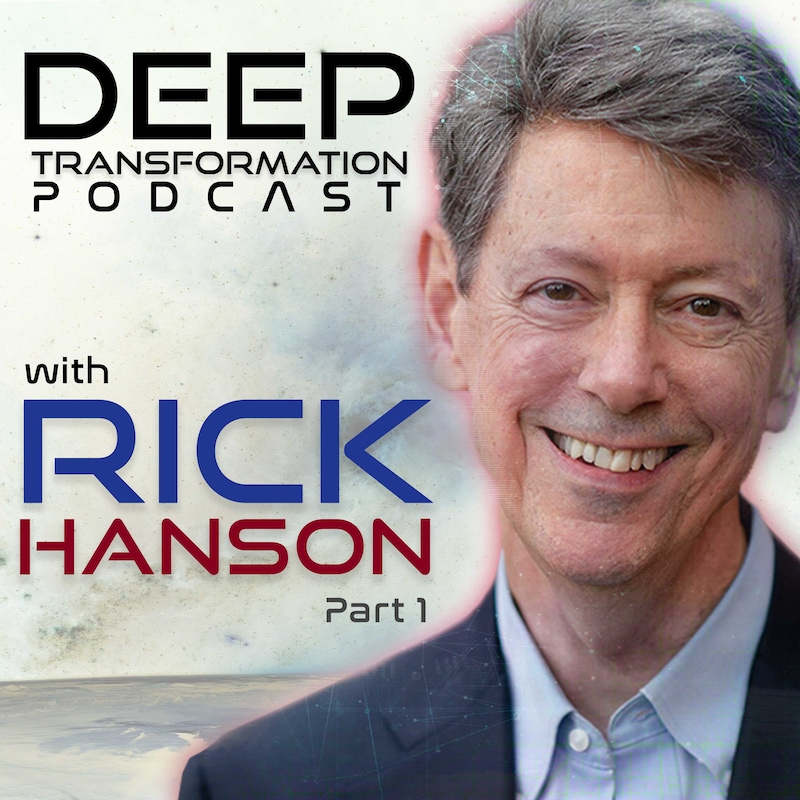Ep. 5 (Part 1 of 2) | In this inspiring and empowering conversation, Rick Hanson spells out how we can use positive, self-directed neuroplasticity to hardwire our brains in order to become happier, cultivate virtues, deal with cravings, become deeply grounded, turn our desired states into stable traits, and more. Neurodharma is Rick’s conceptual creation: a marriage of neuroscience, psychology, and contemporary wisdom that offers individuals who are out to make a change for the better an impressive and effective brain hacking toolkit. Rick’s own gentle wisdom, compassion, clarity, kindness, and humor shine in this truly groundbreaking (for most of us) dialogue, making him a wonderful exemplar of the peaceful, loving, altruistic, and effective person practicing neurodharma can help us to become. Recorded September 20, 2021.
Rick Hanson, Ph.D., is an expert on positive neuroplasticity, a clinical psychologist, a New York Times best-selling author, and a Senior Fellow of the Greater Good Science Center at UC Berkeley. His books include Neurodharma, Resilient, Hardwiring Happiness, Buddha’s Brain, Just One Thing, and Mother Nurture, and have been published in 30 languages. He has lectured at NASA, Google, Oxford, and Harvard, and taught in meditation centers worldwide. Rick's work has been featured on the BBC, CBS, NPR, and other major media. He began meditating in 1974 and is the founder of the Wellspring Institute for Neuroscience and Contemplative Wisdom. Rick loves wilderness and taking a break from emails.
Topics & Timestamps - Part 1
- Introducing Rick Hanson: kindness, books, philanthropy, forging the discipline of neurodharma (01:50)
- What are Rick’s most important takeaways from his life’s work? (05:35)
- Frictionless contentment: grounding unshakeable happiness in the body (05:52)
- We have the power to use our mind (direct our mental activity) to sustain lasting changes in the brain and we cannot escape the responsibility for using (or not using) this (08:41)
- Why do we need neuroscience when meditation does this anyway? (11:34)
- 3 benefits of grounding our practice in neuroscience (13:08)
- To provide sustained motivation (13:17)
- Gives us a common framework of enquiry that helps us operationalize when we’re doing our practices (13:56)
- Highlights the tools that correlate to each individual’s highest priority so they can zero in on what matters the most (15:05)
- Our brain’s negativity bias (16:26)
- How tuning into internal sensations helps steady our mind, stabilize attention, and pull us into the present (17:20)
- Helps identify new methods like neurofeedback (21:10)
- Knowing we are hard-wired to focus on negative experiences helps our own inner work, reducing guilt and extending our compassion (23:08)
- The challenge of stabilizing altered states into enduring traits (24:54)
- How to address craving: building the enduring trait of open-heartedness in the present using neuroplastic change (27:41)
- How do we anchor this? Rick leads a micro samadhi concentration practice (34:32)
- Deliberately resting in the felt sense of nothing wrong steepens your growth curve (41:31)
- Many of the beneficial traits we want to grow in ourselves involve states that aren’t actually that enjoyable. (44:55)
Resources & References - Part 1
- Rick Hanson, author of Neurodharma, Resilient, Hardwiring Happiness, Buddha’s Brain, Just One Thing, and Mother Nurture*
- Founder of the Wellspring Institute for Neuroscience and Contemplative Wisdom, whose mission is to offer skillful means for changing the brain to benefit the whole person and all beings in a world too full of war.
- Senior Fellow, the Greater Good Science Center at UC Berkeley
- Spirit Rock meditation center board member
- Joseph Goldstein, American mindfulness teacher, co-founder of the Insight Meditation Society, author
- Evan Thompson, professor of philosophy, author of Why I Am Not a Buddhist, Mind in Life, and Waking, Dreaming, Being*
- T.S. Eliot, Little Gidding (poem)
- Huston Smith, religious scholar, The World’s Religions, quotes*
- Journal of Positive Psychology
- Milarepa, Tibetan sage and poet
* As an Amazon Associate, Deep Transformation earns from qualifying purchases.
Podcast produced by Vanessa Santos
Show Notes by Heidi Mitchell





